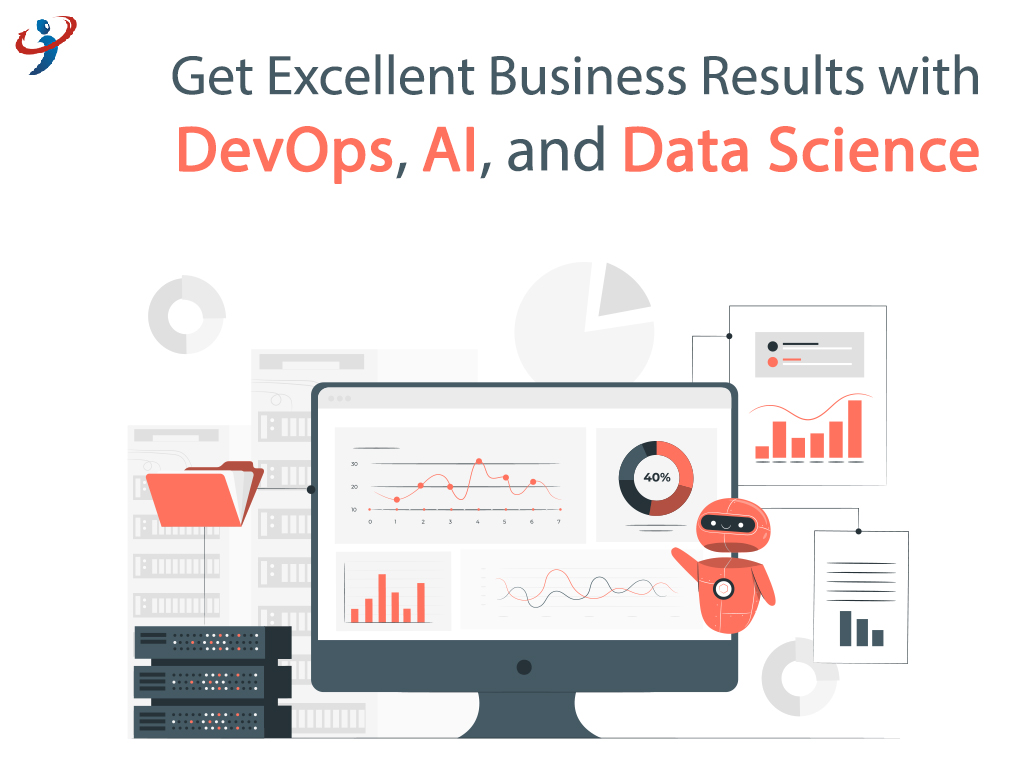Get Excellent Business Results with DevOps, AI, and Data Science

AI and machine learning (ML) technologies are rapidly transforming business functions, including software development. In its pursuit of efficiency, the industry has gradually transitioned away from the traditional Software Development Life Cycle (SDLC) and toward an agile development environment. DevOps has become an industry standard over the last decade. Its primary goal has been to improve product delivery and development through increased communication between software developers and IT operations. The need for a developer-operations balance has led to the rise of the DevOps ethos across industries. According to Grand View Research, the DevOps market will be worth $12.85 billion by 2025, with a CAGR of 18.60%.
It’s no surprise that AI and ML find use in DevOps, given the culture’s emphasis on efficiency and task automation. From improving continuous feedback loops to software testing, DevOps development services complement each other perfectly. AI can smooth out kinks in the system as IT operations become more agile and dynamic.
Gathering Key Data Insights
A DevOps process generates a large amount of data on servers and in logs. Combing through large amounts of data to find specific instances can be time-consuming and expensive. With real-time data analysis, ML optimises application environments to stay afloat in this data deluge.
Supervised learning and training data are helpful for developers in identifying errors that they would miss otherwise in large data clumps. Machine learning can play a key role in analyzing incomprehensible data to identify patterns and behaviours that have applications in data analytics. In addition to reducing noise-to-signal ratios, ML breaks down data silos for product teams to be able to use them across categories, and predefined thresholds can no longer restrict developers from assessing trends in data.
Correlation Among Monitoring Instruments
As development teams grow in size, multiple monitoring tools are used to assess data as well as the health and performance of applications. Multiple data streams are accepted by AI/ML layered algorithms, allowing data correlation across multiple monitoring tools. ML systems connect disparate data systems to provide real-time application health assessments.
Process optimization in DevOps
DevOps services can use adaptive-ML to optimise specific values or metrics toward a specific goal. Neural networks are trained to maximise a single value or parameter, allowing the system to adapt and change while in production. This ensures that values are optimised throughout the development lifecycle.
Enhancing security and IT operations
Large-scale complex dataset mining aids in gaining meaningful insights in predicting product and server failures, avoiding technical drawbacks, and facilitating decision making in the DevOps business framework. The majority of security protocols are implemented at the end of the development life cycle. In the banking sector, DevSecOps—the culture of integrating security into the DevOps process—is gaining traction. This philosophy emphasizes “security as code,” allowing for parallel testing for security and compliance reviews. Banks can meet market demands while continuously monitoring potential security risks by utilising AI-based digital security technology.
Smarter resource management
AI/ML systems aid in efficient resource management by automating routine and manual tasks. Teams now have more time to focus on effective development and coding practices.
Software Testing
Another aspect in which AI/ML applications can be used to evaluate coding errors in test results is software testing. Test automation is an essential component of shift-left testing. The AI assists in running multiple diagnostic tests to determine the root cause of failure. In the event of a test failure, AI can correct the error even before the product is released to the public. This method requires as little human intervention as possible. The continuous feedback loop, on the other hand, helps developers write efficient code while reducing system errors.
The capabilities of AI/ML-driven solutions combined with DevOps are constantly expanding. Hiring skilled talent is a major impediment for AI-driven and DevOps companies as they work to identify bottlenecks. On the foundation of a strong DevOps infrastructure, AI and ML will be synergistic tools for increasing efficiency. With vertical-specific solutions that transform business processes, AI will continue to make inroads into more business cases.